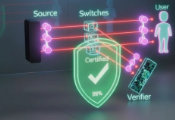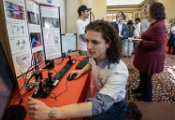Q*Bird Raises €2.5 Million to Accelerate Growth of Its ‘Falqon’ Quantum Security Technology
Delft, Netherlands, Next-generation communications security startup Q*Bird has raised a €2.5 million round to accelerate its growth in the emerging quantum security market. The funding was jointly led by QDNL Participations and Cottonwood Technology Fund, with participation from InnovationQuarter.
Q*Bird has developed a unique quantum cryptography (QKD) product called Falqon, which is based on the fundamental laws of nature and provides provable security against any attack, including those from future quantum computers.
Founded in January 2022, Q*Bird’s goal is to protect data communications and digital infrastructure, using patented technology that outperforms the competition on security and cost. What’s more, the startup’s technology provides secure foundations for the future ‘quantum internet’, which will see quantum computers connecting over long distances around the world.
Q*Bird is currently involved in a large-scale trial of its technology at the Port of Rotterdam, a key part of the European trade economy. It has already secured a launch customer for Falqon, and their product line is due to officially launch later in the year. In addition, it has already signed three other contracts to deploy quantum networks across Europe and partnered with Eurofiber to enhance the security of its networks and its customers.
Compared to other quantum security companies, Q*Bird offers superior upgradability and scalability, with a lower cost per additional user once the technology is in place. The fresh funding will be used to scale up sales of Falqon, and develop further products in the quantum security space.
“My vision for Q*Bird is to become the largest supplier of quantum networking equipment in Europe, US, and beyond,” says co-founder and CEO Ingrid Romijn. “Today, we build devices for quantum-secured data communications. In the future, we will enable general purpose quantum connectivity, by providing new products and seamlessly integrating those with our already existing quantum cryptography network.”




































